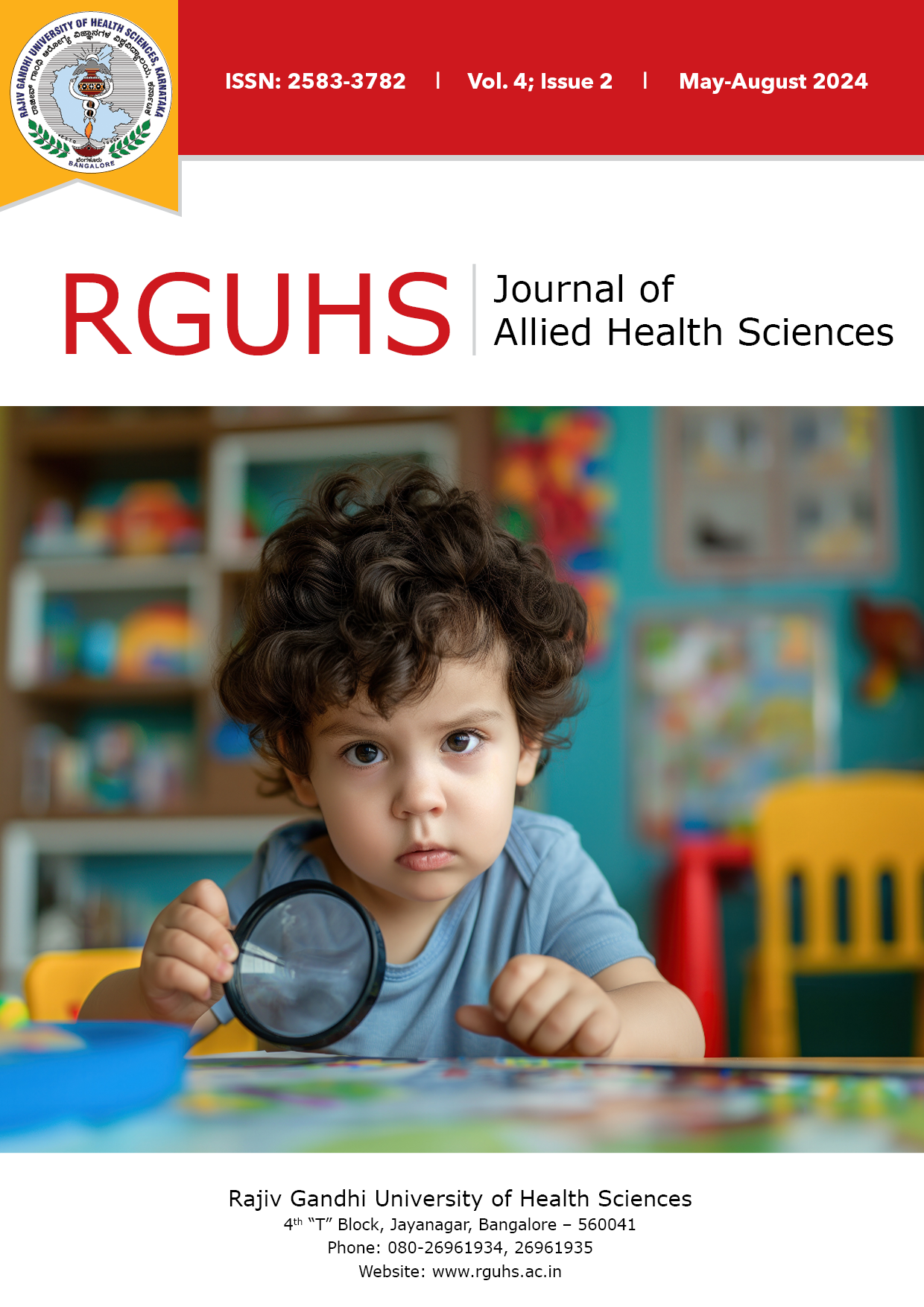
Abbreviation: RJAHSVol No: 4 Issue No: 2 eISSN: 2583-3782
Dear Authors,
We invite you to watch this comprehensive video guide on the process of submitting your article online. This video will provide you with step-by-step instructions to ensure a smooth and successful submission.
Thank you for your attention and cooperation.
Dr. Geraldine Menezes
Editor-in-Chief, RJAHS

Abstract
None
Keywords
Downloads
-
1FullTextPDF
Article
Healthcare industry is no longer what it used to be. The rate of healthcare technological implementation is at an all-time high, and innovative solutions and decisions are entering the market more frequently. Allied health science (AHS) being an important part of healthcare industry, has a pivotal role to play in the technological advancements. Thus, it becomes imperative to train and gear up bachelor’s degree students of allied health science courses to gain factual experience and required additional skills to help them take the healthcare industry to next level.
The institutions and universities handling allied health science courses in India are very conservative and have implemented project work only for fewer courses. To revolutionize the health industry, it is important that students of all allied health science courses are given equal opportunity to carry out project works. Any project forms an introduction to scientific thinking and working. It enables the student to meet program objectives through development of an appreciation of the interrelations between theory, research, and practice. Nevertheless, the concept of project work can sensitize the students about research-oriented education and motivate them to take up research seriously. Perhaps, integrating project work with the internship period would prove beneficial as the students might find more research questions while carrying out practical work.
To keep pace with the emerging technological advancements, Rajiv Gandhi University of Health Sciences (RGUHS) has decided to mandate the project work as partial fulfillment of requirements for the award of Bachelor of Science degree for students of all AHS courses. The project work for bachelor degree students of optometry, prosthetics and orthotics already exists though.
RGUHS, in its revised curriculum for the B.Sc., AHS courses, has stated two important requirements for the award of B.Sc., degree for students taking admissions from the year 2019 onwards. The first point is the change over of six-month internship period to one year and the second point is carrying out project work during the one year internship period. The project work will be a preliminary form of research and to be carried out as an independent investigation. It will be largely the students’ own work and is to be pursued by them from the inception till completion. It involves the student in a hands - on project led by a research supervisor / faculty advisor who will choose, develop and guide the project from its inception to completion. Prior to the practical work, students are required to work out a concept with their supervisor.
The detailed project guidelines have been laid down for B.Sc., MLT and other AHS courses and have been designed to provide the students with a mentored research experience. The students will be encouraged to actively participate in the research project throughout the current applicable phases viz., need for the study, research question / hypotheses formation, literature review, proposal writing, study design, data collection, data analysis, results and discussion. Students of B.Sc., MLT courses are provided with an option to choose a topic from any of the three main subjects that they have under laboratory services. However, total number of students will be divided equally between microbiology, biochemistry, and pathology departments. The students of other B.Sc., AHS courses will carry out projects in the respective specialties.
The eligibility of supervisors / faculty advisors, their educational qualification and experience have been made very clear. The meaningful projects will surely help add immense value to the interns for their future role and the prospects and the institution for its continual improvement.
Editorial is reviewed by Professor Rajesh Shenoy, Dean of Allied Health Sciences, RGUHS, Karnataka.
Supporting File
References
None